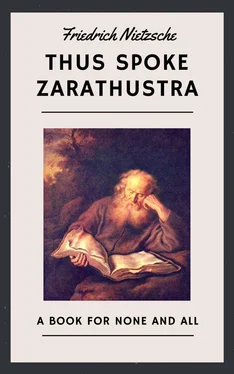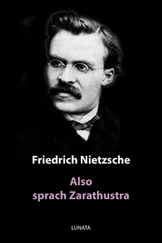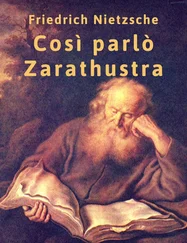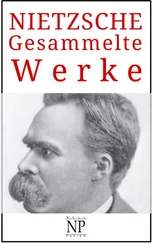Title Page THUS SPOKE ZARATHUSTRA A BOOK FOR ALL AND NONE by Friedrich Nietzsche Translated by Thomas Common
INTRODUCTION BY MRS FORSTER-NIETZSCHE: HOW ZARATHUSTRA CAME INTO BEING.
FIRST PART. ZARATHUSTRA’S DISCOURSES.
ZARATHUSTRA’S PROLOGUE.
ZARATHUSTRA’S DISCOURSES.
I. THE THREE METAMORPHOSES.
II. THE ACADEMIC CHAIRS OF VIRTUE.
III. BACKWORLDSMEN.
IV. THE DESPISERS OF THE BODY.
V. JOYS AND PASSIONS.
VI. THE PALE CRIMINAL.
VII. READING AND WRITING.
VIII. THE TREE ON THE HILL.
IX. THE PREACHERS OF DEATH.
X. WAR AND WARRIORS.
XI. THE NEW IDOL.
XII. THE FLIES IN THE MARKET-PLACE.
XIII. CHASTITY.
XIV. THE FRIEND.
XV. THE THOUSAND AND ONE GOALS.
XVI. NEIGHBOUR-LOVE.
XVII. THE WAY OF THE CREATING ONE.
XVIII. OLD AND YOUNG WOMEN.
XIX. THE BITE OF THE ADDER.
XX. CHILD AND MARRIAGE.
XXI. VOLUNTARY DEATH.
XXII. THE BESTOWING VIRTUE.
THUS SPAKE ZARATHUSTRA. SECOND PART.
XXIII. THE CHILD WITH THE MIRROR.
XXIV. IN THE HAPPY ISLES.
XXV. THE PITIFUL.
XXVI. THE PRIESTS.
XXVII. THE VIRTUOUS.
XXVIII. THE RABBLE.
XXIX. THE TARANTULAS.
XXX. THE FAMOUS WISE ONES.
XXXI. THE NIGHT-SONG.
XXXII. THE DANCE-SONG.
XXXIII. THE GRAVE-SONG.
XXXIV. SELF-SURPASSING.
XXXV. THE SUBLIME ONES.
XXXVI. THE LAND OF CULTURE.
XXXVII. IMMACULATE PERCEPTION.
XXXVIII. SCHOLARS.
XXXIX. POETS.
XL. GREAT EVENTS.
XLI. THE SOOTHSAYER.
XLII. REDEMPTION.
XLIII. MANLY PRUDENCE.
XLIV. THE STILLEST HOUR.
THIRD PART.
XLV. THE WANDERER.
XLVI. THE VISION AND THE ENIGMA.
XLVII. INVOLUNTARY BLISS.
XLVIII. BEFORE SUNRISE.
XLIX. THE BEDWARFING VIRTUE.
L. ON THE OLIVE-MOUNT.
LI. ON PASSING-BY.
LII. THE APOSTATES.
LIII. THE RETURN HOME.
LIV. THE THREE EVIL THINGS.
LV. THE SPIRIT OF GRAVITY.
LVI. OLD AND NEW TABLES.
LVII. THE CONVALESCENT.
LVIII. THE GREAT LONGING.
LIX. THE SECOND DANCE-SONG.
LX. THE SEVEN SEALS.
FOURTH AND LAST PART.
LXI. THE HONEY SACRIFICE.
LXII. THE CRY OF DISTRESS.
LXIII. TALK WITH THE KINGS.
LXIV. THE LEECH.
LXV. THE MAGICIAN.
LXVI. OUT OF SERVICE.
LXVII. THE UGLIEST MAN.
LXVIII. THE VOLUNTARY BEGGAR.
LXIX. THE SHADOW.
LXX. NOONTIDE.
LXXI. THE GREETING.
LXXII. THE SUPPER.
LXXIII. THE HIGHER MAN.
LXXIV. THE SONG OF MELANCHOLY.
LXXV. SCIENCE.
LXXVI. AMONG DAUGHTERS OF THE DESERT.
LXXVII. THE AWAKENING.
LXXVIII. THE ASS-FESTIVAL.
LXXIX. THE DRUNKEN SONG.
LXXX. THE SIGN.
APPENDIX.
NOTES ON “THUS SPAKE ZARATHUSTRA” BY ANTHONY M. LUDOVICI.
PART I. THE PROLOGUE.
Chapter I. The Three Metamorphoses.
Chapter II. The Academic Chairs of Virtue.
Chapter IV. The Despisers of the Body.
Chapter IX. The Preachers of Death.
Chapter XV. The Thousand and One Goals.
Chapter XVIII. Old and Young Women.
Chapter XXI. Voluntary Death.
Chapter XXII. The Bestowing Virtue.
PART II.
Chapter XXIII. The Child with the Mirror.
Chapter XXIV. In the Happy Isles.
Chapter XXIX. The Tarantulas.
Chapter XXX. The Famous Wise Ones.
Chapter XXXIII. The Grave-Song.
Chapter XXXIV. Self-Surpassing.
Chapter XXXV. The Sublime Ones.
Chapter XXXVI. The Land of Culture.
Chapter XXXVII. Immaculate Perception.
Chapter XXXVIII. Scholars.
Chapter XXXIX. Poets.
Chapter XL. Great Events.
Chapter XLI. The Soothsayer.
Chapter XLII. Redemption.
Chapter XLIII. Manly Prudence.
Chapter XLIV. The Stillest Hour.
PART III.
Chapter XLVI. The Vision and the Enigma.
Chapter XLVII. Involuntary Bliss.
Chapter XLVIII. Before Sunrise.
Chapter XLIX. The Bedwarfing Virtue.
Chapter LI. On Passing-by.
Chapter LII. The Apostates.
Chapter LIII. The Return Home.
Chapter LIV. The Three Evil Things.
Chapter LV. The Spirit of Gravity.
Chapter LVI. Old and New Tables. Par. 2.
Chapter LVII. The Convalescent.
Chapter LX. The Seven Seals.
PART IV.
Chapter LXI. The Honey Sacrifice.
Chapter LXII. The Cry of Distress.
Chapter LXIII. Talk with the Kings.
Chapter LXIV. The Leech.
Chapter LXV. The Magician.
Chapter LXVI. Out of Service.
Chapter LXVII. The Ugliest Man.
Chapter LXVIII. The Voluntary Beggar.
Chapter LXIX. The Shadow.
Chapter LXX. Noontide.
Chapter LXXI. The Greeting.
Chapter LXXII. The Supper.
Chapter LXXIII. The Higher Man. Par. 1.
Chapter LXXIV. The Song of Melancholy.
Chapter LXXV. Science.
Chapter LXXVI. Among the Daughters of the Desert.
Chapter LXXVII. The Awakening.
Chapter LXXVIII. The Ass-Festival.
Chapter LXXIX. The Drunken Song.
Chapter LXXX. The Sign.
Imprint
THUS SPOKE ZARATHUSTRA
A BOOK FOR ALL AND NONE
by Friedrich Nietzsche
Translated by Thomas Common
INTRODUCTION BY MRS FORSTER-NIETZSCHE: HOW ZARATHUSTRA CAME INTO BEING.
“Zarathustra” is my brother’s most personal work; it is the history of his most individual experiences, of his friendships, ideals, raptures, bitterest disappointments and sorrows. Above it all, however, there soars, transfiguring it, the image of his greatest hopes and remotest aims. My brother had the figure of Zarathustra in his mind from his very earliest youth: he once told me that even as a child he had dreamt of him. At different periods in his life, he would call this haunter of his dreams by different names; “but in the end,” he declares in a note on the subject, “I had to do a PERSIAN the honour of identifying him with this creature of my fancy. Persians were the first to take a broad and comprehensive view of history. Every series of evolutions, according to them, was presided over by a prophet; and every prophet had his ‘Hazar,’—his dynasty of a thousand years.”
All Zarathustra’s views, as also his personality, were early conceptions of my brother’s mind. Whoever reads his posthumously published writings for the years 1869-82 with care, will constantly meet with passages suggestive of Zarathustra’s thoughts and doctrines. For instance, the ideal of the Superman is put forth quite clearly in all his writings during the years 1873-75; and in “We Philologists”, the following remarkable observations occur:—
“How can one praise and glorify a nation as a whole?—Even among the Greeks, it was the INDIVIDUALS that counted.”
“The Greeks are interesting and extremely important because they reared such a vast number of great individuals. How was this possible? The question is one which ought to be studied.
“I am interested only in the relations of a people to the rearing of the individual man, and among the Greeks the conditions were unusually favourable for the development of the individual; not by any means owing to the goodness of the people, but because of the struggles of their evil instincts.
“WITH THE HELP OF FAVOURABLE MEASURES GREAT INDIVIDUALS MIGHT BE REARED WHO WOULD BE BOTH DIFFERENT FROM AND HIGHER THAN THOSE WHO HERETOFORE HAVE OWED THEIR EXISTENCE TO MERE CHANCE. Here we may still be hopeful: in the rearing of exceptional men.”
The notion of rearing the Superman is only a new form of an ideal Nietzsche already had in his youth, that “THE OBJECT OF MANKIND SHOULD LIE IN ITS HIGHEST INDIVIDUALS” (or, as he writes in “Schopenhauer as Educator”: “Mankind ought constantly to be striving to produce great men—this and nothing else is its duty.”) But the ideals he most revered in those days are no longer held to be the highest types of men. No, around this future ideal of a coming humanity—the Superman—the poet spread the veil of becoming. Who can tell to what glorious heights man can still ascend? That is why, after having tested the worth of our noblest ideal—that of the Saviour, in the light of the new valuations, the poet cries with passionate emphasis in “Zarathustra”:
Читать дальше












